Below is a chronology of important events dates of Tafsut Imazighen, Amazigh Spring, as they unfolded;
-
- March 1-2, 1980:
Mouloud Mammeri is interviewed by Liberation on his last book published by Maspero: “Les poèmes kabyles anciens (Old Kabyle Poems).”
- March 1-2, 1980:
-
- March 10, 1980:
The local authorities canceled a conference on old Amazigh poetry by Mouloud Mammeri at the University of Tizi-Ouzou.
- March 10, 1980:
-
- March 11, 1980:
Out of Tizi-Ouzou University’s 1700 students, 1500 of them demonstrated for more than two hours in front of the wilaya (regional) offices, the offices of the unique party (FLN). They shouted slogans, such as: “stop the cultural repression,” “Amazigh culture is Algerian culture,” “Tamazigh is our language,” “Enough injustice.” They denounced all attempts of political recuperation of their movement. The University is on strike.
- March 11, 1980:
-
- March 12, 1980:
Tizi-Ouzou’s high school students go on strike in support of the university students.
- March 12, 1980:
-
- March 13, 1980:
FFS slogans scribbled on walls appear in Kabylia and the Algiers region. The slogans were in support of the students’ actions: “Democracy, freedom of expression, people’s languages = national languages.” The students’ movement spreads. In Larbaa Nat Yiraten, signs written in Arabic were taken down. The demonstrators blocked the police chief in his car. He was forced to shout the slogan: “a nerrez wala a neknu” (“I’d rather break than kneel,” a verse in the poem by popular Amazigh poet, Si Muhend U Mhend.). The demonstrators invaded the military post. The soldiers sympathize with the demonstrators. The major arrives. The demonstrators ask him for buses so they can inform people in the more remote villages. He apoligizes for not having any available.
A public inauguration by President Chadli scheduled for March 15 in Tizi-Ouzou was canceled. The regional administrator (wali),* Sidi Said calls in the heads of schools in the entire region for a meeting. During the meeting, the head of the Islamic Institute honors Kharroubi, the previous administrator of Kabylia, by referring to him in these terms: “as Kabyle as he was, he was a patriot.” He added: “as far as I am concerned, we should fire on the crowd.”*** (Wali is the Algerian Arabic for the administrator of a region. He was appointed by the unique party. At the time, there were 48 administrative regions or wilayas.)
**(Kharraoubi is known to be against Tamazight and a supporter of arabization. He is considered by many responsible for the failure of the educatoinal system in Algeria.)
- March 13, 1980:
-
- March 15, 1980:
A “Committee for the defense of cultural rights in Algeria” (CDDCA) is formed in Paris. It is housed in the offices of the review Esprit: 19 rue Jacob, Paris, 75006. - March 16, 1980:
200 students demonstrate on Larbi Ben Mhidi Street in Algiers, for the Amazigh culture and for the “Amazigh language, a national language.” They are violently dispersed near the Grande Poste. About 40 people were arrested. Five of the arrested were detained while the others were released. - March 18, 1980:
The local governor visits the town of Azazga. The population expressed its distress in a violent fashion. The governor leaves in a hurry. School kids and high school students flood the streets and assail the Gendarmerie building. The FLN offices are sacked. In Ain El Hammam (formerly Michelet) workers demonstrate in the streets in support of the students’ movement. High school students demonstrate in Draa El Mizan. There were 70 arrests. In another locality, 120 high school students were arrested during another demonstration. Additional troops were brought into the region’s military posts. - March 20, 1980:
The Algerian press speaks of the Tizi-Ouzou demonstrations for the first time. This was done in very obscure terms in an article titled, “les donneurs de leçons” (the lesson givers) by K.B. (Kamel Belkacem), which appeared in the El Moudjahid newspaper. - March 20-26, 1980:
The Algerian authorities receive numerous petitions protesting the repression. - March 30, 1980:
Aït-Menguellet gives a concert at Porte de Pantin in Paris. The Committee for the Defense of Cultural Rights in Algeria calls for a silent gathering in front of the Algerian embassy in France. - April 6, 1980:
General meeting of the students in Hasnaoua*** (Tizi-Ouzou). The students decided to occupy the copy center. They also called for a demonstration on April 7th in Algiers.***(Hasnaoua is the name of the neighborhood where University of Tizi-Ouzou’s main campus is located.) - April 7, 1980:
Algiers, May 1st Plaza, 10:00 a.m.: 500 demonstrators (students and professors) gather mid-morning to claim the right to exist for the Amazigh culture. The banners carried slogans, such as: “For the people’s cultures,” “freedom of speech,” “Isn’t Tamazight an Algerian language?,” “cultural democracy.” The police intervene as soon as the gathered demonstrators started marching. The demonstrators march while chanting, “mindjibalina” (from our mountains came the cry for freedom). They are brutally repressed by the police. Nearly 200 of them are shoved in vans with the help of clubs. Many demonstrators were injured. Five people went into a coma. One demonstrator died from injuries inflicted by the police. The students of the University of Algiers voted to strike. The University of Tizi-Ouzou is on strike and is being occupied by the students.
11:30 a.m.: Meeting of the students at the Faculté Centrale of the downtown campus to decide on a march in front of the central police station to protest the repression.
3:00 p.m.: 1000 people gathered peacefully in front of the Algerian embassy in France. The gathering was initiated by the CDDCA. A motion prepared by CDDCA was sent with a delegation to the Ambassador. The latter refused to receive the delegation and called the protesters “not Algerian.” An open letter to President Chadli was initiated and signatures were collected.
Evening: General meeting of the students. A general unlimited strike is decided. The students decide to occupy the university as well.
- March 15, 1980:
-
- April 8, 1980:
Demonstration in Algiers. More than 1000 students demonstrate while chanting, “Enough repression,” “police assassins,” “free the prisoners,” “Algerian people’s culture.” They also chant patriotic songs. They are forcefully pushed back inside the university where the demonstration continues for nearly two hours. The majority of the persons arrested by the police were released.
In Kabylia, many thousands of peasants from Ain El Hammam and Larbaa Nat Yiraten marched on Tizi-Ouzou. The army established roadblocks and forced them back. The persons arrested the day before were released. The students of the higher education institutes of Boumerdes go on strike. The students of the Faculté Centrale of the University of Algiers issued a motion of support to the students of Tizi-Ouzou. A coordination office was established for Algiers. - April 9, 1980:
The movement spreads in Kabylia. Many demonstrations in favor of the right to existence of the Amazigh culture take place in Ouadhias, Aït-Yanni, Djemaa-Saaridj, Dellys, Bordj, Menaïel, Sidi-Aïch, etc. In Sidi-Aïch, a concert by the singer Ferhat (Imazighen Imoula) was forbidden. The police summoned the singer. - April 10, 1980:
The FLN party in Tizi-Ouzou organize a demonstration against the movement. - April 9-15, 1980:
Village Watch and student support committees are set up in every village of Kabylia. - April 11, 1980:
Mouloud Mammeri responds to El Moudjahid’s article: “Les donneurs de leçons.” Mammeri’s response was rejected by the newspaper, but was published by the French newspaper, Le Matin. Duplicated, it was distributed by the students to people in Algeria and France. - April 13, 1980:
The minister of higher education received a delegation of professors from Tizi-Ouzou. The students of Tizi-Ouzou’s Amirouche High School go on strike and occupy the school. The hospital workers of Tizi-Ouzou sent a motion of support to the students of the University who are still on strike. They also sent a letter to President Chadli asking for an end to the repression. A flier attributed to the FFS party called for a general strike on April 16. - April 15, 1980:
- The CDDCA calls for a peaceful march on April 26, in front of the Algerian embassy in Paris, and another one on May 1st from the “Filles du Calvaire” to the Bastille.
- April 16, 1980:
A general strike was declared and followed in Kabylia. The singer Ferhat from the Amazigh Imoula band was abducted in Dar El Beida at 2:30 p.m. The ministry of Higher Education gives the students of Tizi-Ouzou an ultimatum to go back to classes on April 19. In the evening, a joint meeting for coordination between the workers of Sonelec, Sonelgaz, the Hospital, Sonitex, Casoral, the students, the professors and the high school students was organized. They set up a people’s coordination committee. The employees occupy the Tizi-Ouzou Hospital. - April 18, 1980:
A gathering was held in front of the Algerian embassy in Ottawa. A symbolic march was also held in front of the Canadian parliament. - April 20, 1980:
1:00 a.m.: The Mizrana action was triggered. The forces of repression invaded all the occupied areas (hospital, university, manufacturing plants). The students, caught in their sleep, were clubbed in their beds. Dogs were thrown after the fleeing students. Many students jumped many floors in their underwear.
Many professors were arrested in their homes. All the employees of the hospital, including nurses and doctors were arrested and replaced by army doctors. According to rumors there were as many as 32 dead and many hundreds injured. A spontaneous general strike was triggered by the population of the city of Tizi-Ouzou. No street names remained; neither did any sign that was written in Arabic.
Kabylia was cut off from the rest of the world. Access was forbidden to anyone, in particular to the press. - April 21, 1980:
Sentencing of the 21 of El Kseur. Barricades are set up in the upper side and at the bus station in Tizi-Ouzou. The forces of repression patrol Tizi-Ouzou with the bayonet on their rifles’ muzzle. The main department store in Tizi-Ouzou was sacked (could it be a provocation?). The Folk Art Center was ravaged. The same hapened to the bus station and to the second home of education Minister Kharroubi. The population of the surrounding villages marches on Tizi-Ouzou to protest against repression and the deaths. - April 22, 1980:
A three-day-long general strike was observed. More barricades are seen in the upper side of the city. Demonstrators go around the city with banners asking for an end to the repression and the release of the prisoners. Other banners simply state “Imazighen.” The riot police charges the demonstrators from behind. Fighting breaks out all over town. The villagers come back to town and set up barricades. The offices of APS (Algeria Press Service), SAA (Algerian Insurance Company), the FLN party, the Balloua Hotel, the Mondial Movie Theather are sacked. A strike is started at the Mustapha Hospital in Algiers, in support of the movement. - April 23, 1980:
A fourth day of the general strike was observed. Massive arrests are conducted everywhere. Demonstrators originating from Tigzirt go head to head with the forces of r - April 24, 1980:
epression at the city’s entrance. Violent confrontations take place in Drâa Ben Khedda.
Peace returns progressively. In the afternoon, grocery shops begin to open. Violent confrontations take place between the demonstrators (from Ouadhias, Larbaa and Ain El Hammam) and the forces of repression. The city’s main department store reopens with its shelves fully restocked. - April 25, 1980:
The forces of repression set up a tight net covering the entire city. The Algerian Radio and Television Company films the damaged areas. 5:00 p.m., the Algerian ambassador is received at the Quai d’Orsay. 5:050 p.m., the police commissioner informs the CDDCA of the interdiction of the demonstration scheduled for the next day.
- April 8, 1980:
-
- April 26, 1980:
Despite the interdiction of the demonstration in Paris by the police commissioner under the pretext of “disturbing the public order,” the CDDCA reiterates its call for a demonstration through the media. Nearly 500 people come to demonstrate. 400 among them were arrested and taken to Vincennes where they were searched, photographed, and recorded. The Amicale des Algeriens (Association of Algerian Friendship in France, a government-controlled organization) sent 200 provocateurs to the demonstration. They were brought to Paris by bus and received a daily honorarium. - April 29, 1980:
The prefect of Paris prohibits the silent demonstration planned by the CDDCA for May 1st in fear of “disturbing the public order.” - May 10, 1980:
Concert by Lounes Matoub at the Olympia in Paris. A minute of silence was observed in support of the people’s movement in Algeria. - May 12, 1980:
The University of Algiers is on strike. - May 16, 1980:
El Moudjahid publishes a list of 24 prisoners. Their trial in the State Security Court of Medea was announced. - May 18, 1980:
A general strike in Tizi-Ouzou was massively followed by the population, except for the main department store. - May 19, 1980:
A demonstration against the repression takes place in Algiers. - May 24, 1980:
Government agents assaulted a general student meeting at the Central University of Algiers. - May 25, 1980:
The CDDCA publishes its letter to Chadli with 3522 signatures. - June 3, 1980:
The International Committee for the Support of the Victims of Repression in Algeria publishes a petition. Prepared by the CDDCA it included 140 signatures of eminent personalities from the academic and art world. - June 21, 1980:
2:00 p.m.: Meeting held at the Bourse du Travail in Paris in support of the prisoners in Algeria. Organized by the CDDCA and the International Committee for the Support of the Victims of Repression in Algeria. The meeting’s motto was – End to the repression, – Immediate unconditional release of all prisoners, – People’s languages (Tamazight and Algerian Arabic) are national languages. Many organizations and personalities were invited to the meeting, French and Algerian. Those who paticipated and subscribed to the principles cited were: CDDCA, ASEAP, UNEF, LCR, FEN, FO, OCI, FFS, International Human Rights League, CITA, Harbi, Idir, Lounes Matoub. Djamal Allam and Djurdjura rejected the invitation by CDDCA. Ferhat and Aït-Menguellet could not leave Algeria. - June 25, 1980:
A day of support to the prisoners was organized in Tizi-Ouzou. 8:00 p.m.: APS announces the temporary release the next day of the 24 prisoners of Berrouaghia.
- April 26, 1980:
- June 26, 1980:
A delegation from Tizi-Ouzou went to get the prisoners who were welcomed by a festive Tizi-Ouzou.Hsen Larbi for The Amazigh Voice
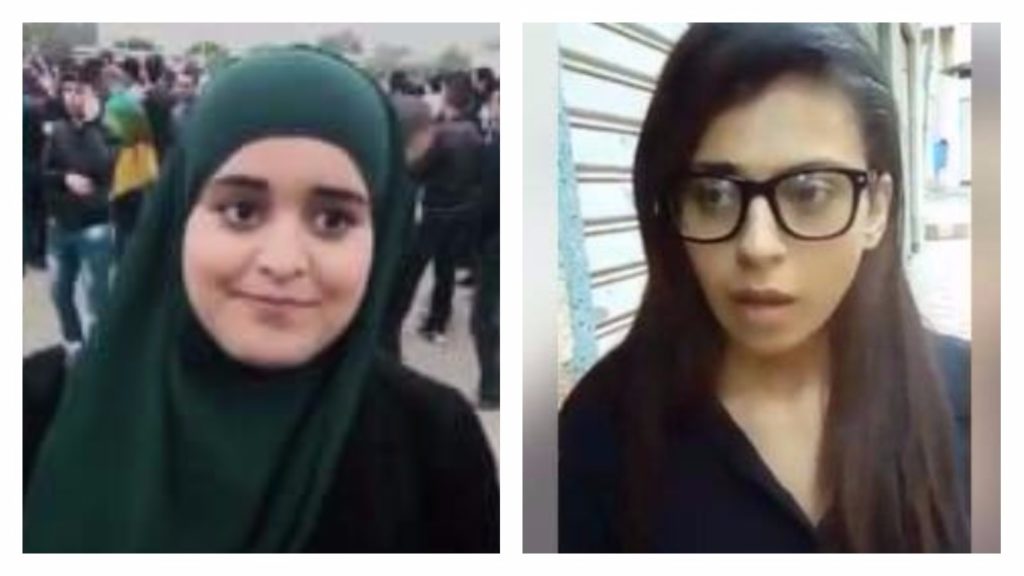
[dropcap]S[/dropcap]hortly after speaking in a live video calling all women in and around Al Houceima city to take to the streets to protest until all Rif detainees are released, Houda Jelloul, 14 years old, daughter of prominent Rif activist Mohamed Jelloul, was arrested on Monday night, along with another teenager named Nawal El Moussaoui, According to her uncle Said Jelloul;
“Houda disappeared shortly after she joined the protests, so we knew right away it had something to do with Morocco’s national security”. The arrest was later on confirmed by Morocco authorities.
After spending nearly 5 hours in detention, Houda and Nawal were released, according to Houda’s uncle, the teenagers have suffered verbal abuse and threatened with imprisonment if she ever decides to go video live again to call for protest.
Said Jelloul added that both girls are still appears strong and determined to continue the fight to fight and continue the protests movement until the release of all detained Rif activists, including her father, Mohamed Jelloul.
Facebook Live video of Houda Jelloul; [ads2]
]]>
Re: Gravely concerned over the continuous repression in the Rif region in northern Morocco.
Your Excellencies,
We, the undersigned international, regional, and non-governmental organizations (NGOs), write to share our serious concerns about the deteriorating human rights situation in Rif, a region of Morocco located in the North part of the country lived by an Amazigh-Berber- population, known for experiencing a long history of marginalization, neglect, and brutal repression.
Arrests and detentions of human rights activists, civilians, journalist and opposition figures have multiplied since late October 2016 when peaceful protests began, as a reaction to the death of a young fish vendor, Mouhcine Fikri, who was crushed to death in a garbage compactor while attempting to retrieve fish that the police had confiscated and thrown away.[ads2]
These protests have increased in size and number, initially around Al Hoceima city, and spreading to other towns of the Rif, supported by gatherings of other Amazigh population in other parts and major cities of Morocco, as well as abroad in the Amazigh Diaspora.
The response of the government of Morocco has not been an effort to listen to the legitimate griefs of its citizens, but a repressive one: troops have been sent to the Rif area to squelch the movement, and the arrests of over 100 leading activists have aggravated the situation. In these events, the flagrant disregard of the Rif people’s human rights has become quite manifest. A cry for help has come out of the young leadership of the Amazigh movement, calling out for support in their struggle to be heard in their legitimate demands for improvement in their social and economic lives, and to bring international attention to the disregard of their human rights by the Moroccan government.
The Moroccan authorities have justified the arrests of its young leaders on the pretext that their call for action and cries for justice are a threat to the welfare of the nation, thus rendering any forceful retaliation necessary. This is a travesty of the situation as it exists for a population which has suffered immensely in the remote and recent pasts.
There are nearly 130 Amazigh detainees in Morocco. The most prominent cases include:
• Nasser Zafzafi
• Mohamed Jelloul
• Mouhamed Elmajjaoui
• Issam Achhbar
• Ayman Fikri
• Silya Ziani
• Nabil Ahamjik
• Mohamed Boulaarassi
• Ilyas El Hajji
• Ayman Fikri
• Abdelilah Bensiaamar
• Khalid Cheikh
• Wassim Boubouh
• Youssef El Fakih
• Yahya El Fakih
• Ayoub Zaghdoud
• Achraf El Yakhloufi
• Hossain El Idrissi
• Mohamed El Majjaoui
• Amin Bouhaddou
• Tarik Anissi
• Omar Bouhras
• Karim El Boukri
• Ibrahim Bouzian
• Othman Bouzian
• Mourad Zafzafi
• Jaouad Hammouti
• Ouassim El Boustati
• Ahmed El Karroudi
• Bilal Farou
• Lhaurdin Chanhout
• Samir Taghdouini
• Bilal Ahabbad
• Bilal El Yahyaoui
• Mohamed Afasi
• Adil El Hachmi
• Izddin El Garrah
• Fouad Essaidi
• Mouhamed Fadel
• El Mortada Imarechen
• Houssein Idrissi
• Ahmed Sultan
• Anass El Khattabi
• Badr Agraf
• ILyass EL Moutaoukil
• Karim Amghar
• Mohamed El Asrihi
• Jawad Sabiri
• Abdel Ali Heddou
In addition, family members of activists are being targeted.
To avoid imposition of such sanctions, and consistent with its commitments as a member of the Council of Europe, the Organization for Security and Cooperation in Europe, the UN Declaration of Human Rights, and other international agreements and covenants, we demand the government of Morocco needs to undertake the following steps:
- Release of all Amazigh-Rif detainees and those imprisoned for practicing their non-violent protest and grant them full political rehabilitation.
- Cease harassment and intimidation of family members of the Rif movement leaders and human rights defenders in Morocco.
- Respect the rights of journalists to do their job unhindered.
- Permit both local and foreign broadcasters to resume operations without fear of state harassment and raids.
To support the struggle of the Rif people, we have decided to lunch a worldwide campaign to issue this statement in the hope to create an international concern which will bring change in the way Morocco treats its autochthonous Amazigh citizens, in the Rif and other rural areas of Morocco (Souss, Atlas mountains), granting them the same social, economic and human rights as those of other citizens. The militarization of the Rif region must stop, and the use of violence by governmental forces against peaceful demonstrators needs to cease.
We hope that Morocco will succeed as a democratic state fully integrated into the international community. We support efforts to resolve peacefully the ongoing Rif Protests. But none of this is possible as long as Morocco continues down the authoritarian path it is currently on.
The government of Morocco cannot be both a respected member of the international community and a repressive, kleptocratic autocracy. It must choose. We urge it to choose democracy and respect for human rights, a course that is in the best interests of the people of Morocco and in the cause of international peace.
Signed,
Amazigh Cultural Network in America
Boston Amazigh Community
Assemblée Mondiale Amazighe -Belgium
The U.S support committee of the Rif’s People movement
Association Tamaynut – Morocco
Tazzla Institute for Cultural diversity – Los Angeles, California
Amazigh Community in New Jersey
Movement for the Autonomy of Rif (MAR)
Sifaks Association – Utrecht, Netherlands
The Frankfurt support committee of the Rif’s People movement
In response to a viral video showing what it appears to be a bunch of men wearing US military uniforms recording a video full of violence threat to Nasser Zafzafi, the leader of the Rif protests, the U.S embassy in Morocco sent out a tweet this morning saying, “The men in msg to Zifzafi video wearing what looks like US military uniforms are NOT US military. We condemn messages supporting violence”
The men in msg to Zifzafi video wearing what looks like US military uniforms are NOT US military. We condemn messages supporting violence.
— U.S. Embassy Morocco (@USEmbMorocco) June 5, 2017
]]>
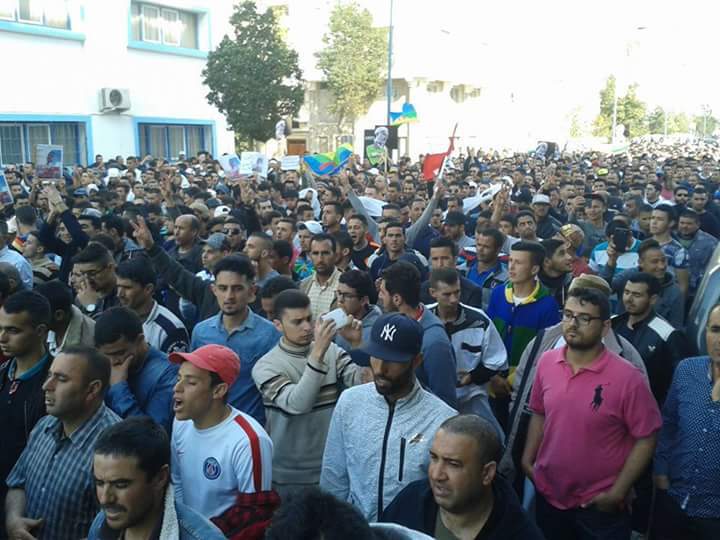
When:
April 29th, 2017 at 2:ooPM
Where:
The King Arts Complex
867 Mt Vernon Ave, Columbus, OH 43203
Reservations:
614-805-3513
Program:
live music by Hacene Ahres, Moh Alileche and many more…
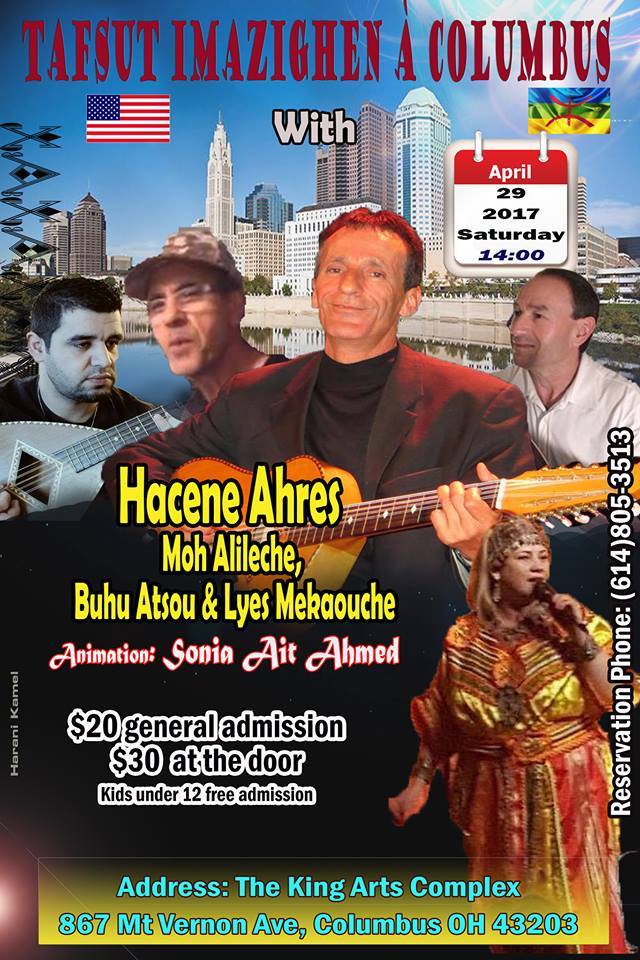
]]>
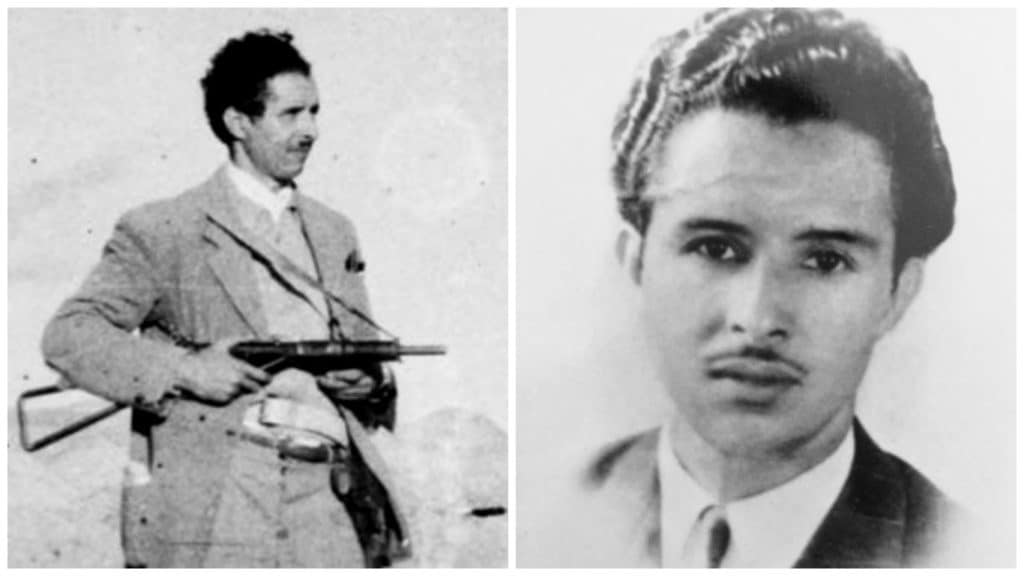
June 27th marks the 60th anniversary of the assassination of Abbas Messaadi, Amazigh leader and one of the founding members of the Moroccan Army of Liberation before his controversial assassination in June 1956 that would ultimately trigger the 1957 Rif Revolt.
Abbas was running a military camp in Aknoul and was assassinated in Fes in June 1956 allegedly by Karim Hajjaj, a member of the Istiqlal party. His assassination was allegedly ordered by Mehdi Ben Barka, one of the younger leaders of the Istiqlal party.
He was first buried in Fes but in 1957 his remains were transferred to Ajdir, in Rif region. the stronghold of Mohamed ben Abdelkrim al-Khattabi, against the wishes of the Moroccan Ministry of the Interior. When security forces were sent by the ministry to repatriate the body to Fes, this sparked clashes with the population in Ajdir which led to the Rif revolt.
His murder was the first in a series of assassinations directed against members of the Moroccan Army of liberation and other factions competing with the Istiqlal party and the Alaouite family.
]]>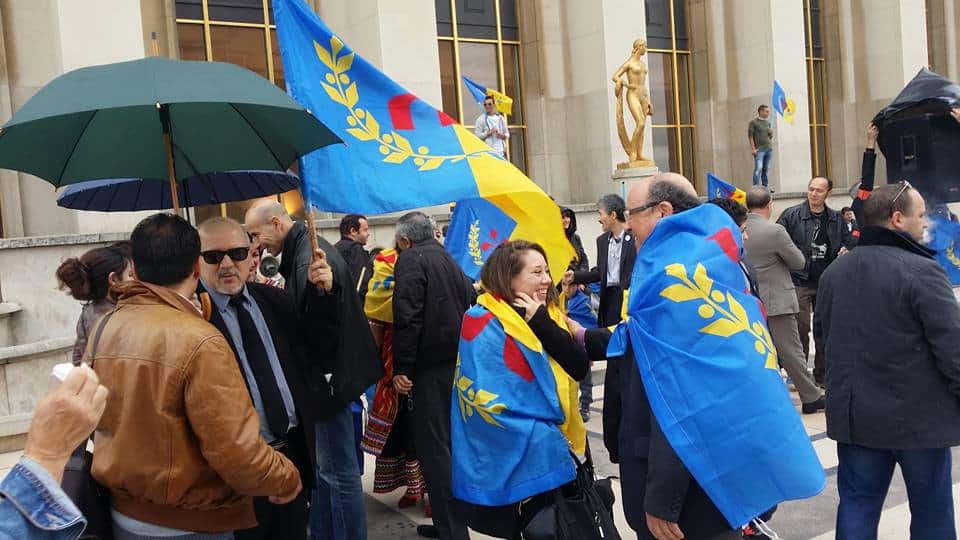
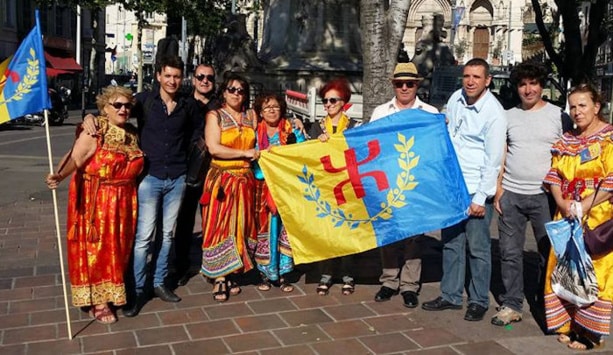
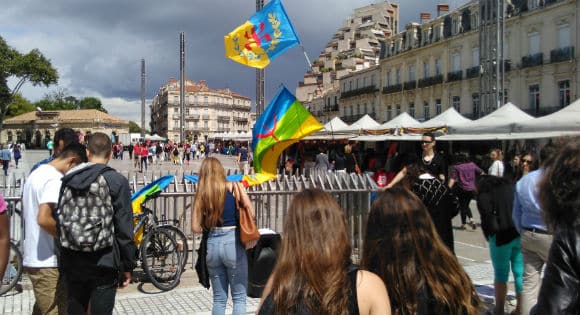
April 30, 2016 4PM-10PM
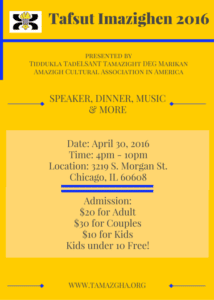
Where:
3219 S Morgan St, Chicago, IL 60608
Event website:
www.Tamazgha.org
Info:
Akli : 630-728-3042
Admission:
Adult: $20
Kids: $10 ]]>
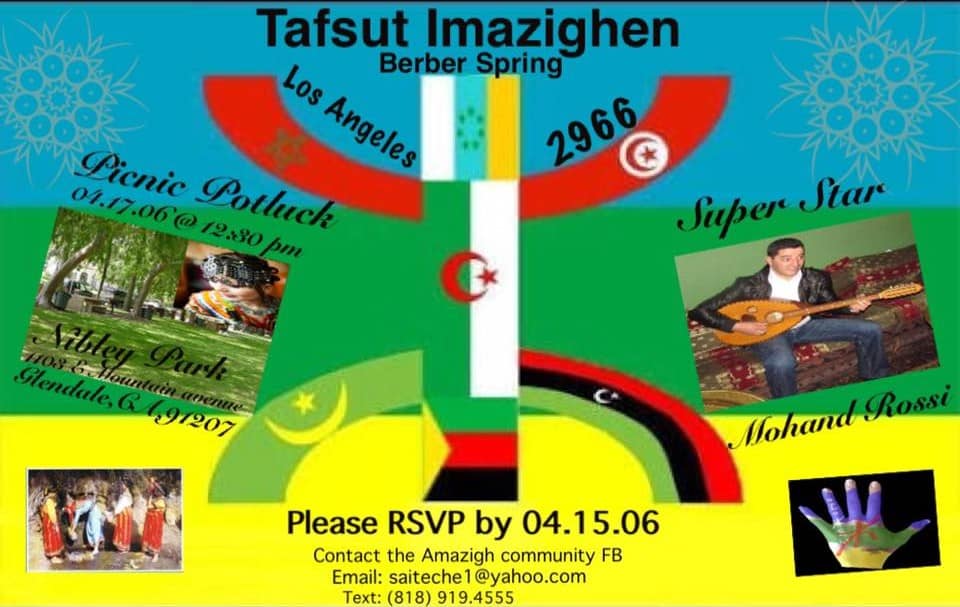
Los Angeles (AWN) Sihem Aiteche,
To Commemorate the 36th Anniversary of the Amazigh spring “Tafsut n Imazighen”, The Amazigh Community of Los Angeles is organizing an event to pay homage to those who made the ultimate sacrifice in the process of saving the Amazigh identity in Kabyle region.
The event will be held on Sunday April 17th from 12:30pm at Nibley Park located at 1103 E Mountain avenue. Glendale , CA 91207.
In addition to the potluck picnic lunch, the event will feature the well known Kabyle singer Mohand Roussi as well as games for kids and many other surprises to announce along the way.
For additional information contact Sihem at [email protected] or send text to 818-919-4555
]]>